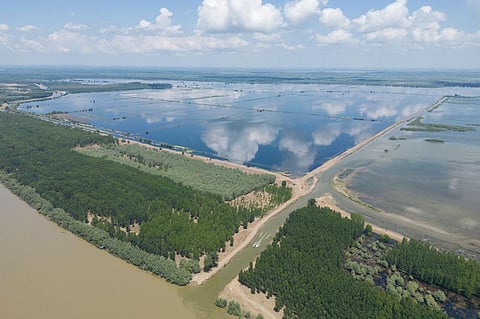

Wildlife conservation organisation World Wildlife Fund (WWF) has urged the Romanian government to classify Mahmudia wetland as a ‘national interest ecological restoration area’ to protect its natural progress and foster community prosperity.
A significant portion of the naturally regenerated wetlands within the Romanian Danube Delta faces the possibility of reversion to agricultural land. Local communities, benefiting from the area in terms of livelihoods and climate resilience, oppose this decision.
The controversy erupted in June 2023, when the Danube River’s high waters breached the dyke enclosing a marshland in Mahmudia, located in the Delta’s eastern part. Eight years earlier, this area had undergone restoration with European Union funding, evolving into a flourishing, biodiverse wetland that greatly enhanced tourism.
The ensuing flood submerged 1,000 hectares of farmland, converting them into a typical delta ecosystem.
The community welcomed the newly flooded wetland, with 97 per cent of locals preferring its current state over draining it once more for agricultural use, according to a survey conducted by WWF-Romania.
However, agricultural leaseholders obtained a court ruling to revert the area to cropland — a decision endangering the entire wetland, including the section restored with European Union (EU) funds. Romania is one of the 28 member states of the EU.
A ’national interest ecological restoration area’ status from the Romanian government for the wetland would ensure the preservation of its natural benefits and the well-being of the local community.
Romanian law empowers the government to protect special sites in this manner, allowing agricultural contracts to be cancelled and leaseholders to be compensated from national funds, the WWF said in a statement.
“WWF stands with the people of Mahmudia as they know how much these restored wetlands benefit their lives and livelihoods,” said Orieta Hulea, WWF-Romania country director.
Restoring healthy wetlands is central to reversing nature loss and building resilience to climate change, she added. “Losing this restored wetland would undermine sustainable development in the area and efforts to restore the health of Europe’s greatest wetlands,” Hulea said.
The protection of the wetland would also establish an important precedent for the Danube Delta, Europe's second largest river delta. According to UNESCO, the Danube's waters, which flow into the Black Sea, form Europe's largest and best preserved deltas. The delta’s numerous lakes and marshes are home to over 300 bird species and 45 freshwater fish species.